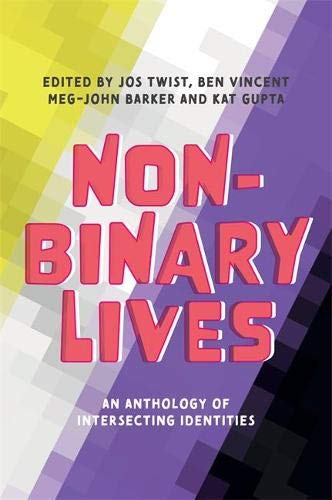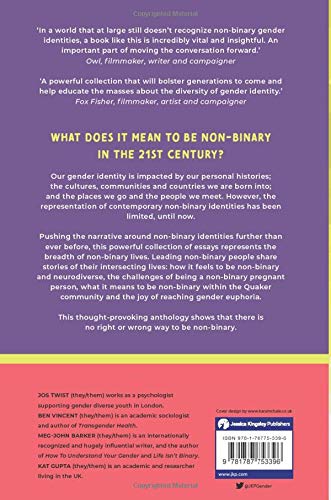Customer Services
Copyright © 2025 Desertcart Holdings Limited
Desert Online General Trading LLC
Dubai, United Arab Emirates



Non-Binary Lives
D**I
Great read
This book was a real enjoyable book while not full of detail about people who are Non Binary it still describes life for people who are Non Binary , Gender Queer , Transgender as well. I would highly recommend this book for anyone who is discovering their own Gender Identity.
Q**
Great Diverse Stories
I tend to have a hard time reviewing books that are about real people's lives because these are personal stories and how do you decide if you like them or not. I focus a lot more on the style of the book and its structure to decide how I feel rather than the content when it comes to these types of writings.I felt that the opening to the book read much more like a textbook than the rest of the book and that put me off. I skimmed through most of that section of the book and put it aside for a while because it wasn't what I was expecting. Something that I did enjoy about the beginning of the book once I went back and read it after finishing the book was the disclaimer to the lack of diversity in the stories included. I felt that it was important to include that disclaimer because as I was reading often times I was discouraged and disappointed that I found very few people who represented my experience as a non-binary queer Latinx person in the U.S.As I decided to skip the introduction and read that once I was done with all the stories I was thrilled to get a chance to read this book. I really appreciated each individual's vulnerability in putting their story on paper for others to see. I thought it was important that each story was unique and that they were all told in different manners.There were quite a few pieces that I was able to relate to and I found myself re-reading those pieces as I found a little bit of myself in them. Something that I really enjoyed was the way this book was separated into four different sections that discussed different ways that people see a non-binary identity. Each section discussed what non-binary means in relation to different intersecting identities and I thought that piece was important to include.Something that did throw me off was that it was written in a way that isn't accessible to everyone. It's written in a way that is meant for individuals who have access to education. I think this is important to note especially for a book that others may recommend to people who are new to understanding what non-binary means. I don't think this is a book that can be used to help educate others on non-binary matters as there were parts that I didn't understand.
L**A
Non-binary essays -- interesting, tho uneven
An interesting collection of essays by and about non-binary persons. From wikipedia:Non-binary is a spectrum of gender identities that are not exclusively masculine or feminine — identities that are outside the gender binary.Most of the authors are living and working in the UK, though a few were from other countries. My impression is that most are therapists and / or gender study students or professional academics.While a few of the essays proved to be overly jargonistic or borderline offensive (one railed against the “ableist, capitalist, patriarchal, white supremist, cisgenderist dominant society” and another kept mentioning “toxic gender binary notions”), most were well-written and explored aspects of the non-binary gender concept that were new to me. Many examined the intersectionality of being non-binary within different cultures or religions as experienced by (for example) a Vietnamese Confucianist, a Jewish feminist, a Quaker, and an Hispanic. One essay explored the effect of motherhood (via the traditional biological pathway) on someone who self-identified as non-binary.I was naively surprised by the references to infighting between differently gendered groups. Said one author: “…the phenomenon of self-identified transsexual folk who are vehemently opposed to non-binary as a concept as they feel it undermines the realness of their own identities. The vitriol they express is nearly as bad as the right-wing opponents of ‘gender ideology’ who are freaking out about the end of gender and gender roles.” Another bemoaned the fact that as a non-binary person, they were no longer able to benefit from the many women-only groups and privileges they had been enjoying. They had been happy to be part of women’s theater companies who were “dedicated to presenting lesser-told stories” as compared to the more “mainstream” companies, “dedicated to working their way through the safe Western dramatic canon of plays by dead cishet white dudes,” and were now unhappy to be automatically lumped in with the outsiders.I’ve been fascinated with the concept of gender and gender fluidity ever since reading Gender Mosaic by Daphna Joel and Luba Vikhanski, and I enjoyed many of the essays in this book. They forced me to examine my own perceptions and actions: Why do I care what gender a person is? Or whom they prefer as a sexual partner? And yet I notice that if I can’t tell at a glance, I spend time trying to figure it out. For some reason I feel I need to know. Does this mean I treat people differently based on gender or simply that I have a great need to keep things categorized in my head? I have no idea!I do know that I am greatly in favor of more inclusion in society, but not at the expense of other groups. Let’s hear more stories and give more opportunities to previously unrepresented groups — but why is it necessary to exclude people simply because some perceive them to have been part of a “privileged” group? Today’s white, cishet, men should not have to suffer because in the past *some* white, cishet, men benefited at the expense of other groups. And why on Earth would we want to belittle the great works of the past simply because their creators were white men when there were others at the time who did not have the same opportunities? Shakespeare’s plays are still amazing as are the works of Mozart, Rembrandt, and Sir Isaac Newton. Let’s work on making the world a place where we can have more greatness, not less.I hate identity politics, and I’m happy to say that most of this book was focused more on individual experiences and perceptions than on politics. Worth a read if you’re curious about the concept.
A**R
A great book
I really enjoyed this book. Most books I have read have been very one sided taking only from one label such as gay, carer, parent, educator etc. This book looks at how people can have all these labels and the effect that has on their lived experiences. I am so glad I bought this book and would recommend it to anyone looking to read about non binary people in a wide context.
Trustpilot
1 month ago
2 days ago